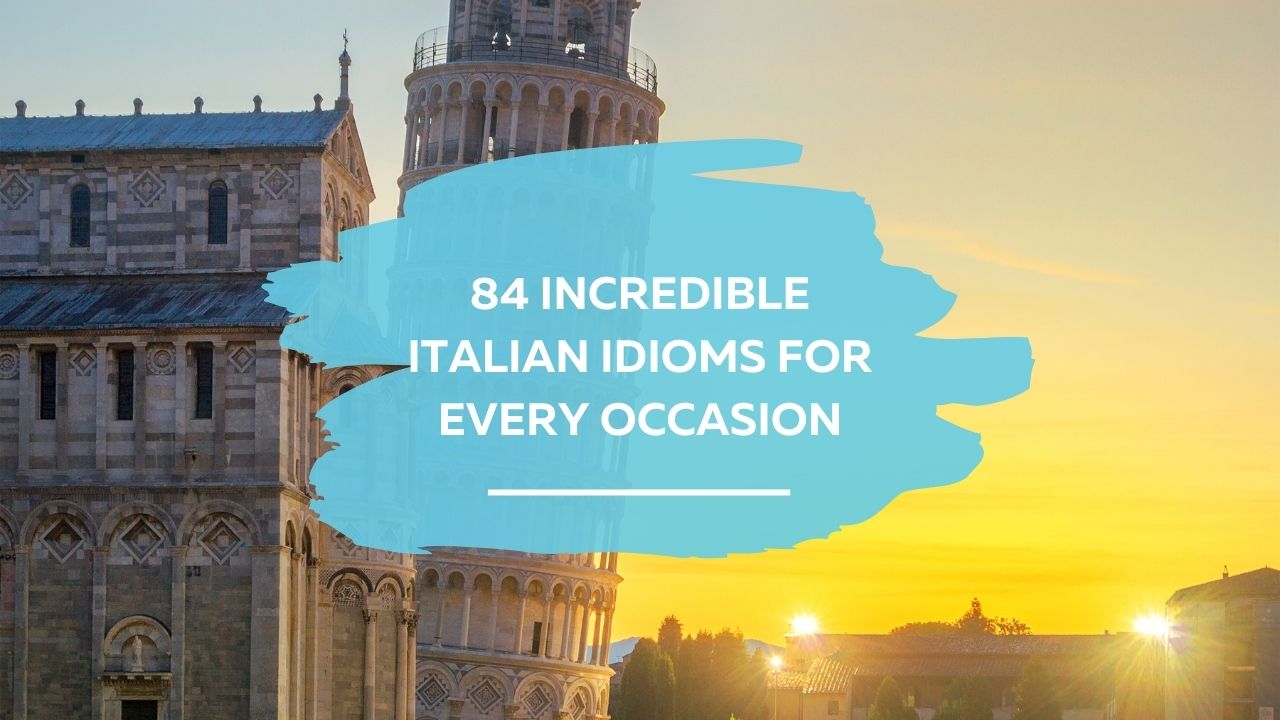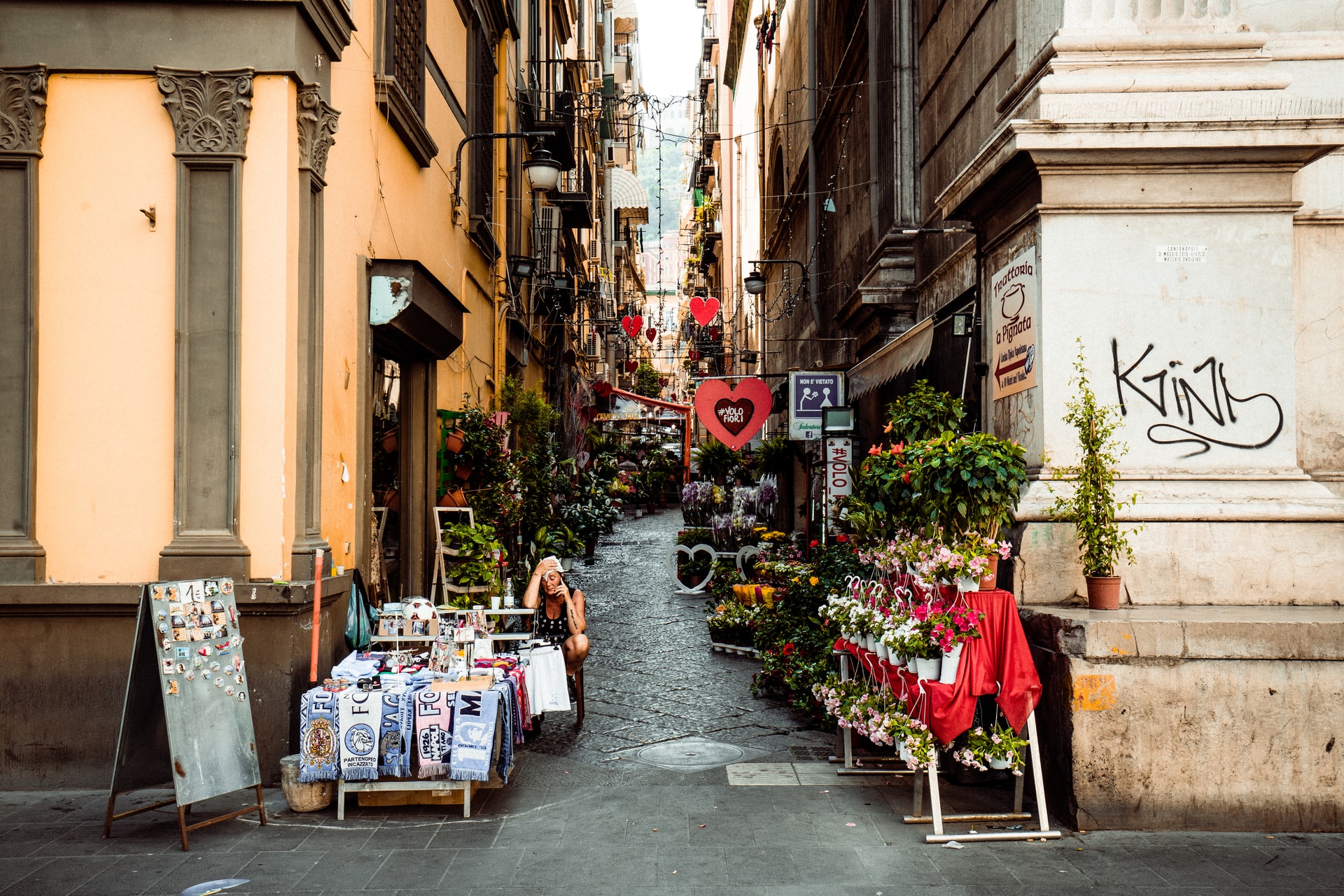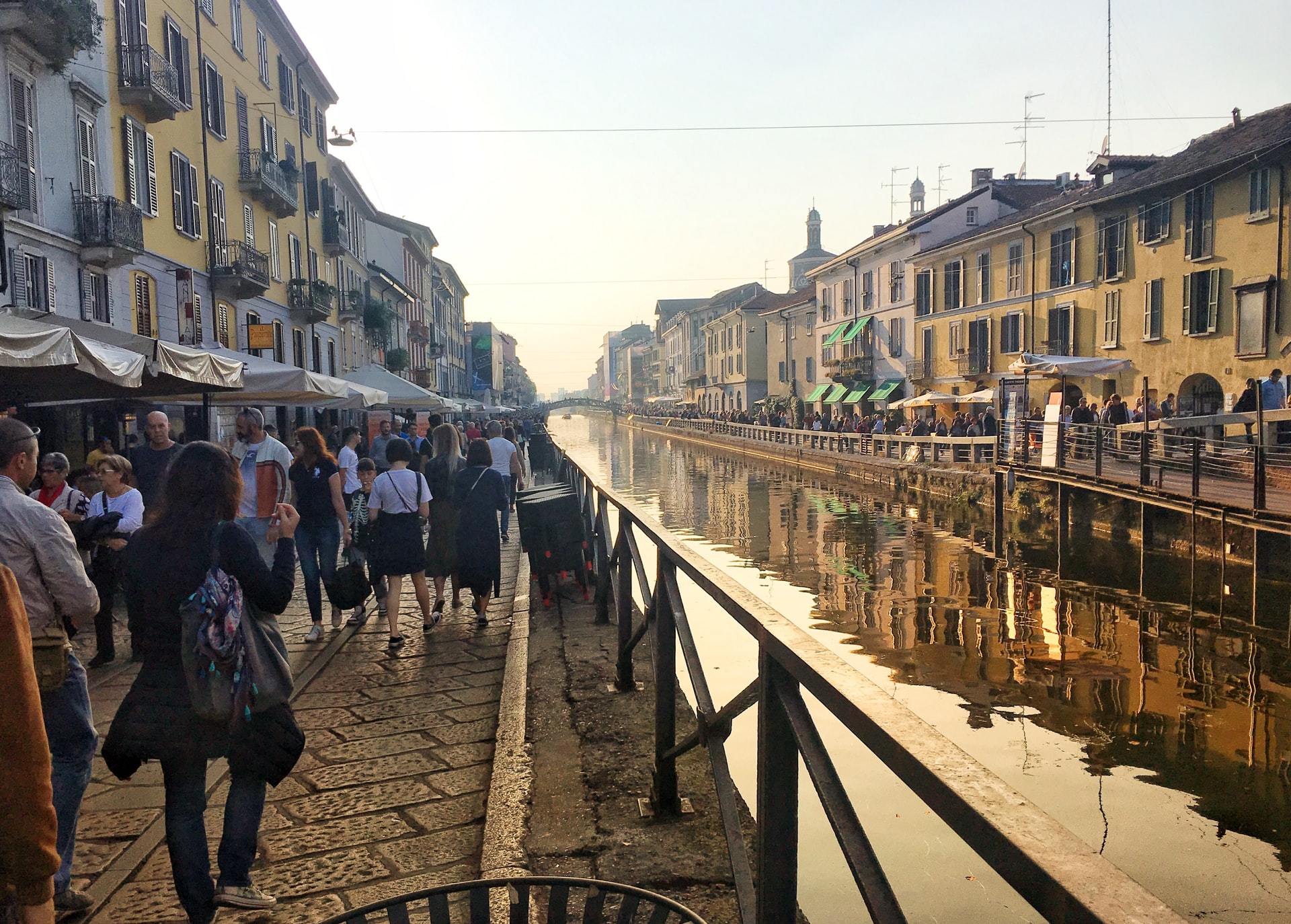
Everyone knows popular idioms in their own language — they are a dime a dozen (that's one right there) – and as you learn Italian, you'll see that Italian idioms are no exception.
So what are Italian idioms like? They can’t just be a translated version of the English ones, you must be thinking. But there are actually a large number of Italian idioms that are just that, and then of course there are a whole lot of language-specific ones.
This article will show you the most popular idioms in Italy, so you can incorporate them into your Italian conversations to impress your friends.
By the way, if you want to learn Italian through stories, not rules, my top recommendation for language learners is my Uncovered courses, which teach you through StoryLearning®. Click here to find out more and try out the method for free.
Table of Contents
Italian Idioms A
All Italian idioms listed below will have short explanation, an example sentence in which the idiom is translated literally, and another sentence, in brackets, meant to explain the meaning if it’s unclear, often with a similar English idiom.
This is so you know how to use these Italian idioms, but also what they really mean word for word. Here goes nothing.

1. A Gambe Levate
Sometimes there are situations in which you can do nothing but run like hell. This is an idiom for those times.
- Ci hanno visto, dobbiamo correre a gambe levate!
- They saw us, we have to run with legs up!
- [They saw us, we have to run like hell.]
2. A Gonfie Vele
And we will stay on track with this next idiom, of similarly positive meaning: full speed ahead.
- Mi aspetto che l'appuntamento stasera vada a gonfie vele.
- I expect that the date tonight will go with inflated sails.
- [I expect that the date tonight will go swimmingly.]
3. A Mali Estremi, Estremi Rimedi
There is a similar saying in English which goes “desperate times call for desperate measures” and means the same thing.
- Ho chiuso la macchina con le chiavi dentro! A mali estremi, estremi rimedi… sono costretta a rompere il finestrino.
- I closed the car with the keys inside! To bad extremes, extreme remedies… I am forced to break the window.
- [I closed the car with the keys inside! Desperate times require desperate measures… I am forced to break the window.]
4. A Perdifiato
This is what you say when something takes your breath away, literally. Like running a marathon, say, or running around like a headless chicken, as they say, to meet a deadline.
- La maratona è domani.
- Allora corri a perdifiato!
- The marathon is tomorrow.
- So run until you lose your breath!
5. A Quattro Palmenti
This idiom is mostly used in connection with eating, meaning that someone is really stuffing their face, getting a massive amount of food down:
- Ieri da Mario ho mangiato a quattro palmenti.
- Yesterday at Mario’s, I ate to four millstones.
- [Yesterday at Mario’s, I ate like a pig.]
6. Acqua In Bocca!
On the larger topic of Italian idioms about water, to have “water in (your) mouth” in Italy means to keep something to yourself. This would be easier to do with a mouthful of water to hold on to, you’ll have to agree.
- Devo dirti una cosa, ma per favore, acqua in bocca!
- I have to tell you something, but please, water in the mouth!
- [I have to tell you something, but please, keep it to yourself.]
7. Ad Occhi Chiusi
You’d use this figure of speech the same way you do its English sibling: when you want to say that you can do something “in your sleep,” or with your “right hand tied behind your back.”
- Potrei guidare questa macchina anche con gli occhi chiusi.
- I could drive this car with [my] eyes closed.
8. All’Impazzata
Everyone knows what it’s like when your heart starts racing, whether it’s over something exciting or nerve-racking. Turns out Italians do, too.
- Ogni volta che la vedo, il cuore mi batte all’impazzata.
- Sarai inamorato..
- Each time I see her, my heart beats like crazy.
- You must be in love.
9. Arrampicarsi Sugli Specchi
This is an interesting idiom because it has several, related but distinct meanings. You can use it to say you are trying something that seems impossible.
Or to say that someone has opinions that are not based on fact or truth, or that someone is trying to justify a wrong argument to defend a bad thing. A little like “clutching at straws.”
- Questo non è vero, adesso non cercare ad arrampicarti sugli specchi.
- That is not true, now don’t try to climb up on mirrors.
- [That is not true, you're grasping at straws.]
10. Avere Il Braccio Corto
No use denying it: nobody likes a cheapskate. In Italy, those people are recognized by a telling and strange bit of anatomy:
- Sicuramente non chiedo a Francesco, che ha il braccino corto.
- Surely I won’t ask Francesco, who has a short [little] arm.
- [Surely I won’t ask Francesco, who is a cheapskate.]
11. Avere Il Sale In Zucca
“To have salt in a pumpkin” is a strange idiom from Roman times, when people used to conserve their valuable, expensive salt inside everyone’s favourite autumn vegetable. Today as back then, not to have it in there means to have little common sense.
- Hai fatto una stupidaggine, tu non hai sale in zucca.
- You did a stupid thing, you don’t have much salt in (the) pumpkin.
- [You did a stupid thing, you’re not the brightest bulb in the box.]
12. Avere Una Cotta
Just like having a crush, but in a more Italian sort of way. This isn’t an Italian idiom that can be translated word for word, so I used the word “crush” in the example below, even if the word isn’t the same.
- A quanto pare, mi sembra che sei tu ad avere una cotta per lui.
- For what it’s worth, it seems to me like it’s you who has a crush on him.
13. Avere Un Diavolo Per Capello
In stressful, difficult times, there is no better Italian idiom to use than this one, which illustrates perfectly what it feels like to be beside yourself with anger.
- Sono arrabbiatissima, ho un diavolo per capello.
- I am very angry, I have one devil for each hair.
- [I am so angry, I’m seeing red.]
Italian Idioms B – D

14. Buio Pesto
Unusual, just as “pitch black” is an unusual way to refer to darkness if you really think about it. Note that pesto in this context has nothing to do with the green, basil pasta sauce.
- Io non vado nella cantina, è buio pesto laggiù!
- I’m not going to the cellar, it’s pitch black down there!
15. Buon Viso A Cattivo Gioco
A close English translation of this idiom would be to “grin and bear it,” meaning that you’ve got to smile even though you may not feel like you have reason to.
- Sapevo che era una bugia, però ho dovuto far buon viso a cattivo gioco.
- I knew it was a lie, but I had to make a nice face to a mean game.
- [I knew it was a lie, but I had to sit there and pretend it wasn’t.]
16. Buono Come Il Pane
This one is cute — it means “good like bread,” and is most often used in connection to a person. Some people are as great as bread, really.
- Matteo è buono come il pane.
- Matteo is good like bread.
- [Matteo is a great guy.]
17. Cadere Dalle Nuvole
Everyone has had the feeling — you think everything is going swell, only to suddenly see or understand something only you didn’t, up to that point. This is also an existing expression in English:
- Laura mi ha lasciato. Dice che non mi ama più…sono caduto dalle nuvole.
- Laura has left me. She says she no longer loves me…I have fallen from the clouds.
- [Laura has left me. She says she no longer loves me…what a slap in the face.]
18. Cadere L’Occhio
In its literal translation the meaning seems obvious, since there is a similar expression in English – use it when something “catches your eye.”
- Visto che mi ci cade l’occhio, uno di voi due potrebbe spiegarmi cosa fa qui questo cane?
- Seeing as my eye is falling on it, could one of you two explain to me what this dog is doing here?
- [Since it has caught my eye, could one of you two explain to me what this dog is doing here?]
19. Carta Canta
This is an idiom that emphasizes the importance of setting things down on paper, because like Lenin said, trust is good but control is better. An antique version of the idiom below is verba volant, scripta manent — words fly, scripture stays.
- Non ci serve un contratto, sai che puoi fidarti di me!
- Lo so, ma carta canta.
- We don’t need a contract, you know you can trust me!
- I know, but paper sings.
- [I know, but it's better to write things down.]
20. Cavallo Di Battaglia
This one is pretty easy: you use it anytime you want to say about something that it is your area of expertise, or more specifically that something is your best work. You can say this about someone else too, of course.
- Quel film è il cavallo di battaglia del regista.
- That movie is the director’s battle horse.
21. Cavare Un Ragno Dal Buco
This idiom is close in meaning to “squeezing blood from a stone”, as in something that is not only difficult, but seems impossible — especially used to say you can’t get someone to tell you what you want to know.
- Mi sa che non caveremo un ragno dal buco con Giulia.
- It seems to me like we won’t dig a spider out of the hole with Giulia.
- [It seems to me like we won’t squeeze blood from a stone with Giulia.]
22. Cervello Di Gallina
It’s a known fact that chickens aren’t very smart. So in Italian as well as in English, saying that someone is “chicken-brained” isn’t too flattering. This entry does just that, with the small difference that gallina actually means “hen.”
- Ho dimenticato il mio cellulare di nuovo. Che cervello di gallina che ho!
- I forgot my cell phone again. What a hen-brain I’ve got!
- [I forgot my cell phone again. What a scatterbrain I am!]
23. Che Ne So
Mostly used in situations where you’d like to make a point of not knowing something, “what do I know” often has an element of “what do I care.” Use it sparingly, in situations like this:
- A che ora arriverà tua madre?
- Che ne so…
- What time will your mother arrive?
- What do I know…
24. Che Palle!
Charming and not entirely safe for work, this idiom is one of the funnier, less serious ones. Strangely, an idiom that references testicles is not really taboo to use in a work environment, for instance.
- Dobbiamo stare qui per tutto il giorno.
- Che palle!
- We have to stay here the whole day.
- What balls!
- [What a pain (in the backside)!]
25. Come Viene Viene
Very similar to the English “let’s see how it goes,” this idiom is quite iconic for the Italian style of leaving things be as they are, or improvising.
- La mia focaccia non ha una ricetta – come viene viene.
- My focaccia doesn’t have a recipe — however it comes (out), it comes (out).
- [My focaccia doesn’t have a recipe — let’s see how it turns out.]
26. Con Le Mani Nel Sacco
When you catch someone with their hands in the proverbial cookie jar, you’d say this in Italian:
- Digli la verità, ti ho colto con le mani nel sacco!
- Tell her the truth, I caught you with your hands in the sack!
- [Tell her the truth, I caught you with your hands in the cookie jar!]
27. Conosco I Miei Polli
A very popular idiom, this is often transliterated by Italians to the English “I know my chicken” as a joke. This means that you know about something, or someone, so well that you know what is going to happen or what they will do.
- Ti faccio una pasta perché avrai sicuramente fame.
- Ma come lo sapevi?
- Conosco i miei polli!
- I’ll make you some pasta because I’m sure you’ll be hungry.
- How did you know?
- I know my chickens!
- [I know you like the back of my hand.]
28. Costa Un'occhio Della Testa
This is a great one for when you want to say something is too expensive. Literally meaning “an eye off of the head,” it is not clear from where else one would be able to take an eye, but it makes a great visual point.
- Quella macchina ti costerà un occhio della testa.
- That car is going to cost you an eye from the head.
- [That car is going to cost you an arm and a leg.]

29. Da Che Pulpito Viene La Predica!
Remember this one for when people want to give you unwanted advice they themselves couldn’t follow. Much like saying “you’re a fine one to talk,” but somehow more dramatic.
- Secondo me devi lasciarlo immediatamente.
- Senti da che pulpito viene la predica!
- I think you have to leave him immediately.
- Listen from which pulpit the lecture is coming from!
- [Look at that, the pot calling the kettle black.]
- 30. Dai Tempo Al Tempo
A wise thing to say when faced with a problem of bleak outlook, to tell someone to “wait and see” is almost never the wrong advice.
- Non mi ha richiamato, sto disperando.
- Dai tempo al tempo, e vedrai che le cose si sistemeranno.
- He didn’t call back, I am getting desperate.
- Give time to time and you will see, things will work themselves out.
- [Let it be for a while and you will see, things will work themselves out.]
31. Due Pesi E Due Misure
This is a handy phrase for when you want to tell someone they are unfairly using a double standard.
- Lei può fare tutto mentre a me non permette niente… questi sono due pesi e due misure.
- She can do everything while she doesn't allow me to do anything… this is a double standard/double yardstick.
Italian Idioms E – I

32. (Essere) Un Asino
To be a donkey requires no explanation — unless you’re a donkey.
- Vincenzo, sei veramente un asino.
- Vincenzo, you really are a donkey.
- [Vincenzo, you really are a fool.]
33. Fare Il Punto Della Situazione
Occasionally, you’ve got to take stock of a given situation and look at what you’ve got. To suggest doing so, you’d say:
- Questo mi sembra il momento giusto per fare il punto della situazione.
- This seems to me to be the right moment to make a point of the situation.
- [This seems to me to be the right moment to sum things up.]
34. Fare Le Ore Piccole
Those familiar with the Sinatra record In the Wee Small Hours of the Morning will understand the point of this idiom, which is to stay up late.
- Sono stanchissimo perché ieri ho fatto le ore piccole.
- I am very tired because yesterday, I made small hours.
- [I am very tired because yesterday, I painted the town (red).]
35. Farfalle Nello Stomaco
Here's another one of those Italian idioms that's just a literal translation of the English one about being in love. It still sounds so much better like this, just because it’s Italian.
- Ieri ho incontrato il mio nuovo vicino… ho le farfalle nello stomaco.
- Yesterday I met my new neighbour… I’ve got butterflies in my stomach.
36. Fare (Qualcuno) A Polpette
“To make meatballs of someone” is as self-explanatory as it sounds like a retro mafia threat. Great one to use if you’re looking for a not-so-subtle effect.
- Se mai ti vedrò parlare con mia figlia, ti faccio a polpette.
- If I ever see you talking to my daughter, I will make you into meatballs.
- [If I ever see you talking to my daughter, I’ll make mincemeat out of you.]
37. Hai Voluto La Bicicletta? Allora, Pedala!
Great to tell someone to both “be careful what they wish for” and “sleep in the bed they made”, this expression is sort of a playful chastisement.
- Sei stato tu a voler venire qui. Hai voluto la bicicletta? Allora, pedala!
- You were the one who wanted to come here. You wanted a bike? So now, pedal!
- [You were the one who wanted to come here. You made your bed, now lie in it.]
38. Ho Fatto Tombola
While the word tombola literally means “raffle,” it is used in the context of getting a good deal, or hitting the jackpot.
- Direi che hai fatto tombola, allora!
- I would say you’ve made raffles, then!
- [I’d say you’ve made a bargain, then!]
39. Ho Il Cuore In Gola!
This is a familiar feeling to most people: you’re about to do something exciting or scary, your ears get hot and your heart rises up into your throat.
- Ieri ho dovuto parlare di fronte a tantissima gente, avevo il cuore in gola.
- Yesterday I had to speak in front of a lot of people, I had my heart in my throat.
40. In Bocca Al Lupo
Literally meaning in the mouth of the wolf, this translates to “good luck” in Italian. You use it by itself, when you want to tell someone you’re rooting for them.
- Oggi devo fare l’esame di matematica.
- In bocca al lupo!
- – I have to take a maths exam today.
- In the mouth of the wolf!
- [Good Luck!]
Italian Idioms J – M

41. L’Abito Non Fa Il Monaco
In English, a perhaps lesser-known translation of this saying also means that “it’s not the clothes that make a man”, i.e. that appearances are not what’s important.
- L’abito non fa il monaco.
- It’s not the cowl that makes a monk.
- [Clothes do not make the man.]
42. Lacrime Di Coccodrillo
Like quite a few of the Italian idioms in this list, this idiom has an English equivalent.
- Non devi fidarti delle sue lacrime di coccodrillo.
- You can’t trust her crocodile tears.
43. Leccarsi I Baffi
When something is finger-licking-good, Italians lick their mustaches. Men, but also women and children. It’s just something to say.
- Questa è una cena da leccarsi i baffi!
- This is a dinner to lick your mustache over!
- [This is a dinner to lick your fingers over.]
44. Liscio Come L’Olio
Italians love olive oil, so it’s only expected that there should be an idiom related to it. Well, it’s actually related to oil more generally, but hey. In this case, it means something went well, without a hitch.
- Sorprendentemente, il matrimonio è andato tutto liscio come l’olio.
- Surprisingly, the wedding went off sleek like oil.
- [Surprisingly, the wedding went as planned.]
45. Mandare All’aria
Intuitive in its meaning, this idiom sounds somewhat like “throwing caution to the wind”, but the meaning is not quite that. Instead, it’s about messing something up, squandering it, or throwing it away.
- Cara, non puoi mandare all'aria tutta la tua vita per lui.
- Darling, you can’t throw your whole life away because of him.
46. Mani In Pasta
An idiom that has a similar corresponding phrase in English: “to have ones fingers in the pie,” this can also be used to say that you're busy with something else at a given moment.
- Quella donna ha le mani in pasta ovunque.
- That woman has her hands in the dough everywhere.
- [That woman always intervenes in other people’s matters.]
47. Matto Da Legare/Matto Come Un Cavallo
Italians think nutty people ought to be tied down — figuratively, of course. So if you’re talking about someone who is mad as a hatter, that’s what you should say.
Alternatively, you can compare them to a horse, which is strange because horses are not really known to be crazy.
- Quel tipo è matto da legare.
- That guy is fit to be tied.
- [That guy is nuts.]
- Ma sei matto come un cavallo, tu.
- You are mad as a horse.
- [You are mad as a hare.]
48. Metterci Una Vita!
To take a lifetime to do something is mostly too long, but sometimes, this idiom can be used in a way that says “I’ll do something even if it takes me a lifetime.” Otherwise, you’d use it like this:
- Dai, siamo già in ritardo, adesso non metterci una vita!
- Come on, we’re already late, now don’t take a life[time]!
49. Mettere Lo Zampino
This one is all about meddling in other people’s affairs, or putting your nose where it doesn’t belong, even if the image is cuter somehow.
- E' qualcosa che non ti riguarda, non mettere lo zampino.
- This is something that doesn’t concern you, don’t put your [little ] paw [in it].
- [This is something that doesn’t concern you, don’t put your nose into other people’s business.]
50. Morire Dal Ridere, Morire Di Sonno, Morire Di Fame, Morire Dal Caldo/Freddo
There are many things you can figuratively die from according to Italian idioms. If something is too funny, a place too cold or a day too long, you can always add some drama by saying it is killing you. For added effect, say you’re dying of it right now, like this:
- Sto morendo di fame!
- I am dying of hunger.
or like this:
- Lei è divertente da morire.
- She is funny, to die for.
51. Morto Un Papa Se Ne Fa Un Altro
Some Italian sayings are so uniquely Italian that you can’t really find a corresponding one in English. Like this next one, which is about the pope and has nothing to do with a father, or papá in Italian, and means that absolutely no one is irreplaceable:
- Non lavora più con noi. Va bene, morto un papa se ne fa un altro.
- She doesn’t work with us any more. Fine, (if) one pope dies you make another.
- [She doesn’t work with us any more. Fine, if one door closes, another one opens.]
Italian Idioms N – R

52. Non Avere Peli Sulla Lingua
”To not have hair on one’s tongue” is said about people who don’t beat around the bush and always say exactly what they mean.
- Carla non ha peli sulla lingua — dice quello che pensa.
- Carla doesn’t have hairs on her tongue — she says what she thinks.
- [Carla speaks her mind.]
53. Non Ci Piove
What an expression to say that there’s no doubt has to do with rain, we don’t know, but it is charming and funny to say. When you want to say that there are no two ways about something, try this:
- Hai commesso un errore gravissimo, su questo non ci piove.
- You have made a big mistake, on this it doesn’t rain.
- [You have made a big mistake, that’s for sure.]
54. Non (Essere) Tutto Un Chilo
Similar to calling someone un asino, a donkey, this idiom is a not-all-too-nice way of letting someone know you think they may have a screw loose. Theories abound as to why not being “one whole kilogram” would suggest that, but no definitive conclusion has been reached.
- Federica, non vorrei offenderti, ma tu proprio non sei tutta un chilo.
- Federica, I wouldn’t want to offend you, but you really are not all of a kilo.
- [Federica, I wound’t want to offend you, but you really have a screw loose.]
55. Non Vedo L’Ora!
When you haven’t seen an Italian friend in a while and are on the phone with them discussing when to meet, this is what you’d tell them to let them know you're looking forward to it:
- Sarà bellissimo rivederti, non vedo l’ora!
- It will be great to see you again, I can’t see the hour!
- [It will be great to see you again, I can't wait!]
56. O La Va O La Spacca!
Near-impossible to translate literally, this idiom is for those hail Mary moments, those times you feel like it's now or never. It’s also the name of a famous Italian TV show.
- Senti, lo devi fare per forza, qua o la va o la spacca.
- Listen, you have got to do it, here it’s make or break.
57. Ogni Due Per Tre
Reportedly of Spanish origin, this one is the opposite of the previous entry, meaning something happens very often.
- Dice bugie ogni due per tre.
- He tells lies every two for three.
- [Two out of three things he says are untrue.]
58. Ogni Morte Di Papa

Another saying that mentions the pope — there seems to be something about the highest office of the catholic church to make Italians creative with their Italian idioms.
This one means “once in a blue moon,” since being pope ordinarily a lifetime position that changes pretty rarely — a blue moon happens a lot more often, in fact.
- Quante volte viene a trovarti?
- Ogni morte di papa.
- How often does she come visit you?
Every death of the pope. - [Once in a blue moon.]
59. Pane Al Pane E Vino Al Vino
Wonderfully intuitive and easy to understand, this often used idiom means to see, and say, things as they are.
- Luciana non ha nessun problema a dire pane al pane e vino al vino.
- Luciana doesn’t have any problems with saying bread to bread and wine to wine.
- [Luciana doesn’t have any problems with being candid.]
60. Perdersi In Un Bicchier d’Acqua
Literally “to lose yourself in a glass of water”, this Italian idiom means to make a big deal out of a rather small problem, or to panic unnecessarily.
- Vedrai che risolveremo tutto, non perderti in un bicchier d’aqua!
- You’ll see we will solve everything, don’t lose yourself in a glass of water!
- [You’ll see we will solve everything, don’t make a mountain out of a molehill.]
61. Piangere Sul Latte Versato
Another of those Italian idioms present the same exact way in the English language, this one is often said wrongly as “crying over spoiled milk,” which can be excused since in both ways, the meaning stays the same, which is: what’s done is done. Still, correctly, it looks like this:
- La cena era stata un disastro, ma non volevamo pensarci. Era inutile piangere sul latte versato.
- The dinner had been a disaster, but we didn’t want to think about. It was useless crying over spilled milk.
62. Pieno Come Un Uovo
Eggs are pretty full, if you think about it. Sure, if it weren’t for this idiom, you probably wouldn’t, but that may kind of be the point. Use this idiom when you want to say a place is packed, or that something else (like your stomach) is totally full.
- Sono tornata, il posto era pieno come un uovo.
- I came back, the place was full like an egg.
63. Piove Sul Bagnato
Another idiom with a rain theme, this one is more logical and self explanatory, with a very similar version in English, “when it rains it pours,” meaning that bad things seldom come alone:
- Mi hanno ritirato la patente, e poi qualcuno mi ha rubato la macchina… piove sul bagnato.
- I had my drivers license taken away and then someone stole my car…it’s raining on wet [things].
- [I had my drivers license taken away and then someone stole my car… bad things come in threes.]
64. Piovere A Catinelle
A great way to describe heavy rain, this is the equivalent of: “it’s raining cats and dogs” — another great, nonsensical idiom. Catinelle are shallow basins, and it’s not clear why those things would be used to describe heavy rain, since you can’t fit much water in them. Oh well.
- Non posso uscire, sta piovendo a catinelle!
- I can’t come out, it’s raining basins!
- [I can’t come out, its coming down in buckets!]
65. Prendere Due Piccioni Con Una Fava
“To kill two birds with one stone” surely sounds familiar. This is basically that saying, but a little more specific in terms of the bird and the tool.
- Come mai sei venuto a portarmi queste cose personalmente?
- Ero vicino e pensavo di prendere due piccioni con una fava.
- How come you came to bring me these things personally?
- I was nearby and thought I’d take two pigeons with one (fava) bean.
66. Prendere Lucciole Per Lanterne
This idiom can be used when you feel like someone is trying to pull the wool over your eyes or if you think someone is just not getting something, misunderstanding you.
- Non sarò un gran genio, ma non sono neanche il tipo che prende lucciole per lanterne.
- I may not be a great genius, but I’m also not the type to take candles for lanterns.
- [I may not be a great genius, but I’m also not the type to be clueless/easily tricked.]
67. Ridotto All’Osso
Down to the bone is similar to ridotto all’osso, in that it means that something is reduced to the bare minimum.
- Il mio stipendio è stato ridotto all’osso.
- My salary has been reduced down to the bone.
68. Rompere Il Ghiaccio
Translated as “to break the ice” it means the same exact thing and is used the same as the English idiom.
- Ho detto una barzelletta perché volevo rompere il ghiaccio.
- I told a joke because I wanted to break the ice.
69. Rompere Le Scatole
An old, tongue-in-cheek expression that is the child-friendly origin of a number of more popular, adult Italian idioms, intended to show how much someone is annoying you.
- Mamma, non voglio andare a casa!
- Piertro, non rompermi le scatole.
- Mum I don’t want to go home!
- Pietro, don’t break my boxes.
- [Pietro, don’t get on my nerves.]

Italian Idioms S – V
70. Sei Un Coniglio
While bunnies are cute, being one in the eyes of another person usually doesn’t mean anything too flattering. When someone tells you this in Italy, what they really mean is that you are a chicken.
- Patrizia, per certe cose, ha molto coraggio, per altre è un coniglio.
- In certain situations, Patrizia has a lot of courage, in others she is a rabbit.
- [In certain situations, Patrizia has a lot of courage, in others she is a wallflower.]
71. Sputa Il Rospo!
To spit the rospo, or “toad” in English, is something like “to spill the beans,” but it’s mostly used when the thing about to be said is unpleasant, embarrassing or otherwise negative.
- Devo dirti un segreto, ma ti prego, non arrabbiarti.
- Dai, sputa il rospo!
- I have to tell you a secret, but please don’t get angry.
- Come on, spit the toad!
- [Come on, spit it out!]
72. Stare Con Le Mani In Mano
One of the simple Italian idioms that are quite literal in their meaning, this one is for those times you’re standing around doing absolutely nothing, or want to complain about someone else being the opposite of useful:
- Ma guarda questo, sta con le mani in mano a far niente.
- Well look at that one, standing with his hands in his hand doing nothing.
- [Well look at that guy, standing there not lifting a finger.]
73. Stare Sulle Spine
An almost literal translation of the English “on pins and needles,” this idiom means the exact same thing, as well, meaning that you can’t wait for something — usually it’s to be told information, rather than looking forward to a holiday.
- Dai, non farmi stare sulle spine.
- Come on, don’t make me stand on needles.
- [Come on, I’m on pins and needles.]
74. Stare Sullo Stomaco
According to Italians, when someone gets on your nerves, it feels like a meal that’s heavy in your stomach. So about that bothersome guy at work you’d say:
- Bruno è cosi fastidioso… mi sta sullo stomaco.
- Bruno is so annoying… he gets on my stomach.
- [Bruno is so annoying…he rubs me the wrong way.]

75. Tale Madre/Padre Tale Figlio/a
If you want to say that the apple doesn’t fall far from the tree to an Italian person, you’d say:
- Francesco ha i tuoi stessi occhi. Tale padre, tale figlio.
- Francesco has your same eyes. Like father, like son.
76. Testa Di Legno
This idiom is to be used when you are frustrated with someone’s stubbornness, their inability or unwillingness to understand your point.
- Ma perché non capisci quello che ti dico, testa di legno!
- Why don’t you understand what I am telling you, head of wood!
- [Why don’t you understand what I am telling you, you’re stubborn as a mule!]
77. Tirare Un Pacco/Dare Buca
…is what flakes do in Italy. When you get stood up, this is a great way to make the story sound funnier than it feels.
- Mi sa che Laura mi ha tirato un pacco.
- Ti ha dato buca? Mi dispiace.
- I feel like Laura threw me a parcel.
- She gave you a hole? I’m sorry.
- [I feel like Laura has stood me up.
- She flaked out? I’m sorry.]
78. Ti Sta A Pennello
…means that something “suits someone like a glove”, or looks very good on them.
- Che bello quel vestito, ti sta a pennello!
- What a pretty dress, it suits you to a (paint) brush!
- [What a pretty dress, it suits you to a t.]
79. Tra L’incudine E Il Martello
The Italian version of “being stuck between a rock and a hard place,” it can be used in any place you’d use the English idiom, like this:
- Non so cosa fare, mi trovo tra l’incudine e il martello.
- I don’t know what to do, I find myself between the anvil and the hammer.
- [I don’t know what to do, I find myself between the devil and the deep sea.]
80. Tutto Fa Brodo
Food related Italian idioms abound in Italy, and this one is no exception. You would use it anytime you’d want to say “might as well” or “what’s the harm.”
- Posso invitarti a cena?
- Tutto fa brodo, a questo punto.
- Can I invite you to dinner?
- Everything makes broth, at this point.
- [Sure, why not.]
81. Un Ago In Un Pagliaio
Another one of those Italian idioms with a literal English translation, you’ll recognise this one if you’ve ever searched for something you were unlikely to find.
- Trovare Maria sarà come cercare un ago in un pagliaio, ma forse saremo fortunati.
- To find Maria will be like looking for a needle in a haystack, but maybe we will have some luck.
82. Un Colpo Grosso
Un colpo grosso mostly has a positive connotation, as in some major good thing that happens, a big deal.
- Lo so che sarebbe veramente stato un colpo grosso per te.
- I know it would really have been a big deal for you.
83. Un Pezzo Grosso
“A big chunk” is a big chunk whether it comes to pie, money, or change. But in Italian, it means something a little different: a big shot.
- Non so se è vero, però ho sentito che si è fidanzata con un pezzo grosso.
- I don’t know if it’s true, but I heard she got engaged to (/is dating a) big shot.
84. Vai A Farti Benedire!
Benediction is serious business in Italy, a strongly religious nation. Still, it’s hardly blasphemous to tell someone to get one if you want them to get out of your sight.
- Non voglio vederti più. Vai a farti benedire!
- I don’t want to see you any more. Go get yourself blessed!
- [I don’t want to see you any more. Beat it!]

Italian Idioms FAQ
What does che pizza mean in slang?
Che pizza literally means “what a pizza,” but it's used in Italian slang to express boredom, annoyance, or something tedious. It's similar to saying “what a drag” or “how boring” in English.
The idea is that something feels as long and dull as waiting for a pizza to bake.
What is a famous Italian phrase?
A famous Italian phrase is: La vita è bella. This means “Life is beautiful” and reflects a positive and optimistic view of life. It's also the title of a beloved Italian film that emphasizes hope and resilience.
What does tutto pepe mean?
Tutto pepe literally translates to “all pepper,” but in slang, it means someone who is lively, energetic, or full of spirit. It's used to describe a person with a vibrant and dynamic personality.
What is a good Italian proverb?
A well-known Italian proverb is: Chi va piano, va sano e va lontano.
This translates to “He who goes slowly, goes safely and goes far.” It emphasizes the value of patience and steadiness to achieve lasting success.
Italian Idioms For Every Occasion

So there you have it: 84 Italian idioms to sprinkle into your Italian conversations to impress your Italian friends or family.
While a list of Italian idioms like this one is a great starting point, to really start learning and using these idioms, you'll need to immerse yourself in Italian.
Try to spot these Italian idioms and others when you're in daily contact with the language by watching Italian movies and YouTubers or listening to Italian podcasts.
What better way to pick up Italian idioms than by following the rules of StoryLearning and reading Italian blogs or short stories in Italian. As you see idioms page after page, they'll stick in your mind without you having to study them.
And if you really want to learn Italian by reading, your best bet is to enrol my course, Italian Uncovered, where you master the language through story, not rules. Get your free 7-day trial of the course.

Olly Richards
Creator of the StoryLearning® Method
Olly Richards is a renowned polyglot and language learning expert with over 15 years of experience teaching millions through his innovative StoryLearning® method. He is the creator of StoryLearning, one of the world's largest language learning blogs with 500,000+ monthly readers.
Olly has authored 30+ language learning books and courses, including the bestselling "Short Stories" series published by Teach Yourself.
When not developing new teaching methods, Richards practices what he preaches—he speaks 8 languages fluently and continues learning new ones through his own methodology.









































